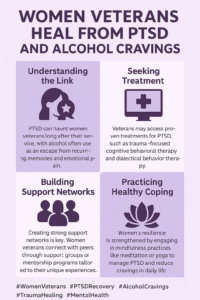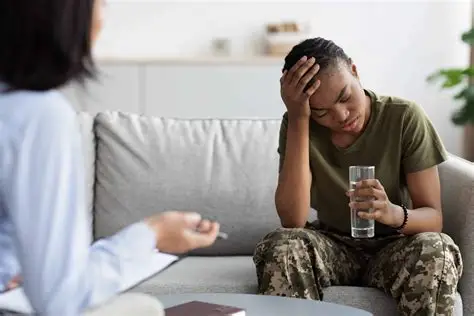PTSD and alcohol cravings can be challenging hurdles for women veterans, but with awareness, support, and practical strategies, recovery is absolutely possible. I know how stories from other female vets and finding the right resources can change everything when it comes to managing posttraumatic stress and handling the urge to drink. Here’s how women veterans are building healthier lives after military service, one step at a time.
Understanding PTSD and Alcohol Use in Women Veterans
PTSD stands for posttraumatic stress disorder, which is a mental health challenge that can develop after experiencing or witnessing traumatic events. For women who have served in the military, PTSD can be sparked by a range of experiences, including combat, harassment, or even just the constant intensity of service life. Alcohol cravings can sometimes follow, often used to numb emotions, manage anxiety, or get through sleepless nights. This connection is not random and is more common among women veterans than civilian women.
The U.S. Department of Veterans Affairs reports that women veterans are more likely than their civilian peers to experience both PTSD and alcohol use struggles. This double hit can come with extra layers of stigma and feeling alone, especially since women aren’t always expected to be on the front lines or to deal with the marks of combat stress. Challenging these stereotypes and finding the right tools to move forward is essential.
First Steps to Healing: Facing PTSD and Alcohol Cravings Head-On
Getting started on the path to recovery can feel overwhelming, but it’s possible with the right approach. For many women veterans, accepting the reality of PTSD and admitting how alcohol cravings are affecting their lives takes both honesty and self-kindness. Remember, no one has to do this alone—support can make all the difference.
- Reach Out for Support: Connecting with other women veterans, family, or trusted friends can make a difference. Peer groups dedicated to women vets provide safe spaces to talk openly without judgment and help build solidarity and understanding.
- Learn the Triggers: Paying attention to what brings up PTSD symptoms or cravings—a particular memory, stress, or even specific social settings—offers valuable clues. Keeping a journal or making notes of patterns gives insight for future planning.
- Find Professional Guidance: Therapists who specialize in trauma and military life—especially those who focus on women’s experiences—offer practical, individualized approaches. Many VA centers have professionals available for one-on-one or small, women-only groups.
Coping Strategies and Tools That Really Work
Overcoming PTSD and resisting alcohol cravings doesn’t happen overnight, but there are proven strategies that many women veterans have found helpful along the way. These can be personalized for each person, helping to make everyday life more manageable.
- Mindfulness: Focusing on the present moment, with deep breathing or guided meditations, can break the cycle of anxious thoughts and help sidestep cravings. Several apps with sessions designed for trauma recovery can offer support whenever needed.
- Routine and Structure: Establishing a steady daily schedule, such as meals, exercise, or hobbies, brings a sense of predictability that helps manage anxiety and cravings. Even small rituals provide comfort and balance, like a peaceful wind-down in the evening.
- Healthy Substitutes: Swapping alcohol for nonalcoholic drinks, herbal teas, or getting active helps keep cravings at bay. Many women pick up crafts, journaling, or participate in community exercise to stay busy and engaged.
- Grounding Techniques: Holding something cool or textured, taking a scent inventory, or describing your surroundings aloud can help bring focus back to the present during flashbacks or intense moments.
The Substance Abuse and Mental Health Services Administration (SAMHSA) and the VA’s Women Veterans Call Center offer confidential advice and can point you toward resources in your area. Don’t hesitate to check in; extra support can make things more transparent and easier to handle.
Common Hurdles and How Women Veterans Get Past Them
Recovery isn’t always a straight path. There are standard stumbling blocks that many women veterans face while dealing with PTSD and alcohol cravings. Being aware of these hurdles can help you anticipate challenges and shape a plan to avoid relapses or setbacks.
- Stigma: Many women feel judged or worry they’ll seem “weak” if they ask for help. Finding communities and programs that focus on women’s unique military experience, like the Service Women’s Action Network, makes sharing and getting support easier and free of guilt.
- Isolation: Feeling misunderstood or alone is common, especially where there aren’t many other women veterans nearby. Online platforms, group chats, and virtual meetings create much-needed connections without geographical limits.
- Access to Care: Family, distance, or work commitments can make reaching help harder. Telehealth and video sessions have allowed more women to get support whenever and wherever it fits their routine. Many clinics offer evening and weekend hours.
- Co-Occurring Conditions: It’s very common for depression or anxiety to show up alongside PTSD, driving alcohol cravings higher. Integrated treatment focuses on both issues, and clinics offer more coordinated care, particularly in larger VA facilities.
More Support: Resources Tailored to Women Veterans
There’s support built especially for women who’ve served, and finding the right resources at just the right moment can completely change someone’s recovery adventure. The following programs and services can point you in the right direction if you or a loved one needs help:
- Women Veterans Program Managers (WVPM): Every VA medical center has a WVPM. They work to connect women veterans with care that fits their unique needs.
- Veterans Crisis Line: This free, confidential helpline is open 24/7 for all distressed veterans. You can call, text, or chat online for fast support.
- Give an Hour: A non-profit that links military members and their families to free mental health support in person and through telehealth.
- Local Vet Centers: These often provide women-only groups, trauma counseling, and general health checkups in a casual, comfortable setting outside the main hospital.
These organizations help you learn about PTSD, build life skills, and take the edge off cravings so you can keep moving forward.
Everyday Habits That Strengthen Recovery
Some women veterans say that developing certain habits makes recovery much more doable. More minor changes, consistently applied, create a structure that helps them stay on track even when motivation dips low.
- Stay Connected: Whether it’s friends, family, or fellow vets, regular check-ins create a safety net for tough days.
- Exercise: Any movement helps—you don’t have to do anything significant. Walks, yoga, stretching, and short rides give your mood and energy a steady boost and keep alcohol cravings in check.
- Nutritious Eating: Stable blood sugar keeps mood and cravings on a deeper level. Even simple meal planning or healthy snacks can build a better foundation for recovery.
- Therapeutic Activities: Arts, gardening, small home improvement projects, or volunteering offer focus and meaning, slowing down negative thought spirals.
Returning to these habits keeps your momentum going even on hard days. With time, these routines fill the spaces where alcohol or anxiety used to sit.
Questions Women Veterans Are Asking
Women who’ve served often want honest answers about handling PTSD and alcohol cravings. Here are some frequently asked questions and guidance based on real experiences and expert advice.
Question: What if I don’t feel comfortable in traditional veteran groups?
Answer: Many women-focused options are available in person and online. Groups like SWAN and Women Vets on Point are great places to find safe and supportive environments.
Question: Will talking about trauma make things worse?
Answer: Sharing can feel intense in the beginning, but trauma-informed therapists always move at your own pace and let you stay in control. Peer groups and confidential helplines let you speak only as much as you want until you’re ready for more.
Question: What if cravings or symptoms spike suddenly?
Answer: Keeping a buddy or trusted support contact is essential. You can also create a small kit with grounding tools—like a favorite journal, calming music, or a sensory item—to help during challenging moments.
Long-Term Recovery: Hope, Resilience, and Moving Forward
So many stories prove that recovery is possible and life truly improves after tough times. Women veterans who manage PTSD and alcohol cravings frequently mention finding new confidence, deepening friendships, and discovering skills they never expected. Recovery doesn’t have a quick fix, but it’s all about showing up for yourself while staying open to growth and support.
Wherever you’re starting, every step forward counts, and there’s always a network of people and tools ready to help. If you or someone you know is struggling, taking the leap and reaching out is a positive step toward building a healthier future—one habit, conversation, and victory at a time.
Video: Women Veterans REBUILD Lives After PTSD

